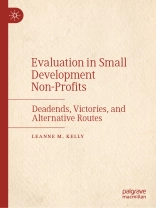Research on evaluation shows that low-use and non-use of evaluation is common, yet evaluation is hailed as beneficial and worthwhile. The worth of evaluation is tied to its utilisation, presenting a paradox if evaluation is both revered and underutilised. This book investigates this paradox in the under-researched context of small development non-profit organisations, which have specific resource constraints and ‘bottom up’ community development values that complicate their ability to do and use evaluation in line with top down directives. The book examines the utility, meaningfulness, and purpose of evaluation from small non-profit perspectives, and explores whether evaluation has value for these organisations. For development practice, it presents evaluative alternatives that reconceptualise evaluation as part of the active process of development rather than as an interval-based add-on. For evaluation theory, it highlights a historical preoccupation with improving evaluation without assessing its inherent worth, and considers alternative ways to enhance the value of evaluation for small non-profits.
Mục lục
1 The nature of the problem.- 2 The story of evaluation.- 3 A framework for community development evaluation.- 4 Small is beautiful.- 5 Overt and hidden practices of small non-profit evaluation.- 6 Forms of evaluation use in small non-profits.- 7 Practitioner perceptions of evaluation in small non-profits.- 8 Alternative routes: so what and now what?.- Index.
Giới thiệu về tác giả
Leanne M. Kelly has spent most of the past two decades working in social services and community development not-for-profits across four continents. She has worked for small, medium, and large not-for-profits with the majority of her roles focused on evaluation.












